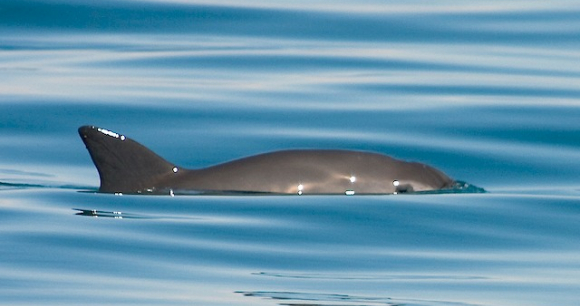
Shrimp, Fish from Northern Gulf of California Embargoed
Washington, DC—The US National Marine Fisheries Service (NMFS) announced today that it will ban imports of Mexican shrimp and other seafood caught in the habitat of the critically endangered vaquita porpoise. The action is being taken under the Marine Mammal Protection Act (MMPA), which requires the US government to prohibit the import of seafood caught using fishing gear that kills marine mammals in excess of United States standards.
The import ban places enormous pressure on the Mexican government to stop the use of deadly gillnets that are entangling, drowning, and killing the vaquita porpoise, whose population has likely dwindled to just 10 remaining animals. The northern Gulf of California is one of Mexico’s most valuable fishing regions.
“This is exactly how the law protecting marine mammals is supposed to work: if Mexico’s fisheries kill vaquita at a rate that violates US standards, the US must ban imports," said Zak Smith, senior attorney at the Natural Resources Defense Council (NRDC). “Mexico has no choice but to eliminate the destructive fishing taking place in the northern Gulf of California that is driving the vaquita to extinction. It’s the only hope the vaquita has for survival, and it is required if Mexico wants to resume exporting these products to the United States.”
Vaquita numbers plunged from around 560 animals in the 1990s to only about 10 today due to entanglements in gillnets set to catch shrimp and various species of fish. The vaquita is now on the brink of extinction. Scientists have warned that the vaquita will be lost unless Mexico fully and permanently bans all gillnets in the animal’s habitat and massively steps up enforcement.
“This embargo is a crucial step toward ending the Mexican government’s utter indifference to the vaquita’s extinction,” said Sarah Uhlemann, international program director at the Center for Biological Diversity. “Since President Lopez Obrador took office, his administration has sat by and watched these tiny porpoises spiral toward oblivion. But money matters, and this embargo should finally get Mexico’s attention.”
In 2018, responding to a lawsuit filed by conservation groups, the US Court of International Trade ordered the Trump administration to ban shrimp, chano, sierra, and curvina seafood imports from Mexico caught with gillnets in the vaquita’s habitat consistent with the MMPA.
Today’s embargo expands that ban to include almost all seafood caught in Mexico’s northern Gulf of California. The ban covers highly lucrative trawl-caught shrimp; curvina, sierra, and sardines caught with a purse seine net; sierra caught with hook-and-line; and almost any seafood caught with a gillnet, including anchovy, herrings, sardines, mackerels, croaker, and pilchard.
“Consumers in the United States do not want to be complicit in the extinction of any marine mammal, and this is reflected in the MMPA’s mandate,” said D.J. Schubert, wildlife biologist at the Animal Welfare Institute. “The breadth of these sanctions sends a strong message to Mexico that its utter failure to protect the vaquita will not be rewarded with access to US markets.”
Under international pressure, the Mexican government in 2017 officially banned most—but not all—gillnet fishing in the vaquita’s habitat. But Mexico failed to enforce the ban. In October 2019, the Sea Shepherd Conservation Society documented around 70 small boats in a single day illegally setting gillnets in vaquita habitat.
International pushback continues to mount against Mexico as the vaquita plummets toward extinction. In June 2019, the World Heritage Committee voted to list the vaquita’s habitat (a designated World Heritage site) as “in-danger” due to the vaquita’s decline. Mexico must now adopt “corrective measures” under the World Heritage Convention or risk losing its World Heritage designation.
In October 2020, a committee under the Convention on International Trade in Endangered Species of Wild Fauna and Flora (CITES) will consider trade sanctions against Mexico for its failure to stem illegal exports of gillnet-caught fish protected by CITES.
###
- Marjorie Fishman, Animal Welfare Institute, (202) 446-2128, margie@awionline.org
- Josh Mogerman, NRDC, 773-531-5359, jmogerman@nrdc.org
- Sarah Uhlemann, Center for Biological Diversity, (206) 327-2344, suhlemann@biologicaldiversity.org
- Alejandro Olivera, Center for Biological Diversity, +521(612) 104-0604, aolivera@biologicaldiversity.org (en español)
The Animal Welfare Institute (www.awionline.org) is a nonprofit charitable organization founded in 1951 and dedicated to reducing animal suffering caused by people. AWI engages policymakers, scientists, industry, and the public to achieve better treatment of animals everywhere—in the laboratory, on the farm, in commerce, at home, and in the wild. Follow us on Facebook, Twitter and Instagram for updates and other important animal protection news.
The Center for Biological Diversity is a national, nonprofit conservation organization with more than 1.7 million members and online activists dedicated to the protection of endangered species and wild places. The
Natural Resources Defense Council (NRDC) is an international nonprofit environmental organization with more than 3 million members and online activists. Since 1970, our lawyers, scientists, and other environmental specialists have worked to protect the world's natural resources, public health, and the environment. NRDC has offices in New York City, Washington, DC, Los Angeles, San Francisco, Chicago, Bozeman, MT, and Beijing. Visit us at www.nrdc.org and follow us on Twitter @NRDC.